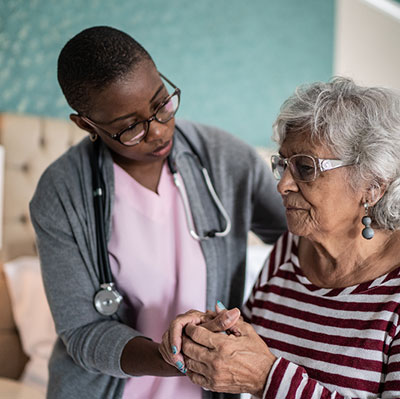Surgery to Treat Tremors Gets an Artist Creating Again

March 28, 2022
Timothy Welch was 43 when he was diagnosed with Parkinson’s disease 13 years ago. The Whiting, New Jersey, resident had been working as a chef, but “sharp knives and tremors really didn’t go together too well,” he says. Undaunted, he went back to college and got a master’s degree so he could work as a substitute special education teacher at the elementary school where his wife taught second grade.
While subbing in an art class one day, he joined the students in drawing and discovered an ability to create art that he didn’t realize he had before his diagnosis. He soon began exhibiting and selling landscape paintings and self-published a book of his work. He donated portions of his sales to nonprofit organizations supporting Parkinson’s research.
But as his Parkinson’s disease progressed, his ability to move became so limited that he could no longer get around independently. He stopped teaching, and while he kept creating art at home, he ceased showing his work at local venues.
When he and his wife moved from upstate New York to New Jersey in 2021, Timothy had to find a new neurologist to help manage his Parkinson’s. He was looking for a cohesive team that could support him on his long-term journey. “Luck,” he says, brought him to Rocco DiPaola, M.D., a neurologist with a specialty in movement disorders at Jersey Shore University Medical Center.
“Part of the reason I chose Dr. DiPaola was for the whole team,” Timothy says. “Their communication lines were all in sync, and that was important. I thought the quality of my care would be better.”
Relief From Tremors
During their first meeting, Dr. DiPaola evaluated Timothy and suggested that he might benefit from deep brain stimulation (DBS) surgery. DBS surgery places thin electrodes into specific areas of the brain and connects them under the skin to a pacemaker-like device inserted under the collarbone or in the abdominal cavity. Electric pulses from the device are sent to the brain to reduce tremors.
“DBS is not a cure for Parkinson’s disease, but it helps control the symptoms, specifically tremor, dyskinesias and motor fluctuations—stabilizing functional activity for years,” Dr. DiPaola says.
Dr. DiPaola referred Timothy to the Chair of Neurosurgery at the Neuroscience Institute at Jersey Shore, Shabbar F. Danish, M.D. “I thought the surgery would be successful for him,” Dr. Danish says. “I thought it would allow him to eliminate most of the medications he was taking and improve his quality of life.”
Timothy had DBS surgery in January 2022, and as soon as his pacemaker-like device was turned on and properly adjusted a few weeks later, he felt an immediate improvement in his symptoms.
“It’s like night and day,” he says. He is walking much better, his tremors are under control, and the medications he had been taking have been eliminated or the dosages reduced.
“My quality of life has vastly improved,” Timothy says, so much so that he already has art shows scheduled for the summer. “I can’t thank my medical team enough. They’re more like a family unit, and I’m kind of one of theirs now.”
Next Steps & Resources:
- Meet our sources: Shabbar Danish, M.D., and Rocco DiPaola, M.D.
- To make an appointment with a doctor near you, call 800-822-8905 or visit our website.
- Learn more about treatment for Parkinson’s disease and other movement disorders or email Movement.Disorder@hmhn.org.
The material provided through HealthU is intended to be used as general information only and should not replace the advice of your physician. Always consult your physician for individual care.
Is Parkinson's Hereditary?

About 10 to 15 percent of all Parkinson’s disease is caused by genetics. But research points to a combination of genetic and environmental factors as likely causes.

Healthy at Home with Parkinson's
It is essential that people living with Parkinson’s integrate exercise of their body, brain, voice, speech and swallowing muscles.

I Have Parkinson’s. Now What?
After receiving a diagnosis of Parkinson’s, many patients come to their physician with the same questions. Our expert shares his answers to the top six most frequently asked questions after diagnosis.

Doctors Explain Fluorescent Guided Brain Surgery
It’s much easier to see where you’re going when your path is well lit, and the same can be said for removing brain tumors.

What Are the Early Symptoms of a Brain Tumor?
Detecting a brain tumor early in its development can help improve outcomes. Our expert shares the early symptoms of a brain tumor, and when to seek help.

